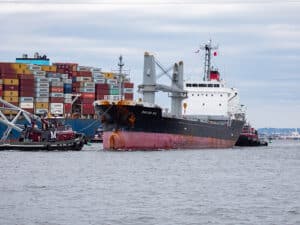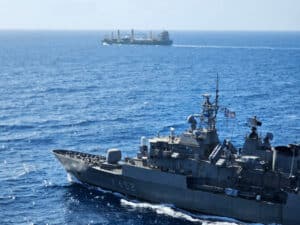
Cummins methanol retrofit kit project wins U.K. funding
Written by Nick Blenkey
An Ocean Infinity Armada 78 meter lean-crewed offshore service vessel will be used in Cummins methanol conversion kit project. [Image: Ocean Infinity]
Cummins Inc. (NYSE: CMI) reports that its proposal to develop a methanol retrofit kit for its QSK60 engine has been awarded GBP 4.4 million (about $5.36 million) in total funding through the U.K. Government’s Zero Emission Vessels and Infrastructure (ZEVI) competition.
One of only 10 selected under the ZEVI competition, the project will see Cummins and its project partners — Ocean Infinity, the Aberdeen Harbor Board, and Proman AG — deploy deploy a U.K.-designed and built methanol retrofit kit for a high-horsepower marine internal combustion engine, giving the U.K. an important foothold in enabling the transition to cleaner maritime fuels.
“Cummins is honored to be selected by the UK Government in support of this dual fuel project that aligns well with our bridge technologies strategy,” said Mark Bargent, Cummins technology architecture and planning director. “We remain committed to helping the maritime sector reach its goal of 50% reductions in greenhouse gas emissions by 2050, as required by the IMO. To get there, shipbuilders need a roadmap for their decarbonization plans.”
As part of the consortium, Ocean Infinity will provide one of its Armada 78 meter lean-crewed hybrid offshore service vessels for Cummins to design, develop, and test the dual fuel HVO (hydrotreated vegetable oil) and methanol technology. Earlier this quarter, Cummins announced the approval of unblended paraffinic fuels — often referred to as renewable diesel, including HVO — in all its high horsepower engines for all industrial applications.
“Ocean Infinity exists to use innovative technology to transform operations at sea for the benefit of people and the planet,” said Ocean Infinity’s chief technology officer Josh Broussard. “This project forms part of our wider future fuels strategy targeting a transition from traditional energy sources to low carbon alternatives to ultimately minimize the environmental impact of our ship operations. Our strategy includes advanced bio-fuels, such as HVO and methanol, to bridge the gap before eventually developing ammonia in the future.”
The Port of Aberdeen — which has ambitions to become Scotland’s premier net zero port — is providing its facilities and services for testing the vessel, while Proman AG will contribute its expertise in methanol production and the development of ultra-low carbon methanol production.
On completion in the second quarter of 2025, the methanol retrofit kit project targets a reduction in CO2 emissions of 50% for offshore operations of the vessel with NOx, SOx and PM at levels considerably below those emitted by conventional fuel. Aditionally, all retrofitted dual-fuel engines will be compliant with IMO Tier III emission standards.
“This project, with its focus on the conversion of existing engine installations, offers a seamless transition between today and the future builds of new, cleaner technology ships,” said Molly Puga, executive director – strategy, product planning & digital at Cummins. “It dismisses the need for a major vessel overhaul and creates an immediate positive impact on carbon emissions reduction in all environmental and operating conditions, ultimately helping the maritime sector meet our global climate needs.”




